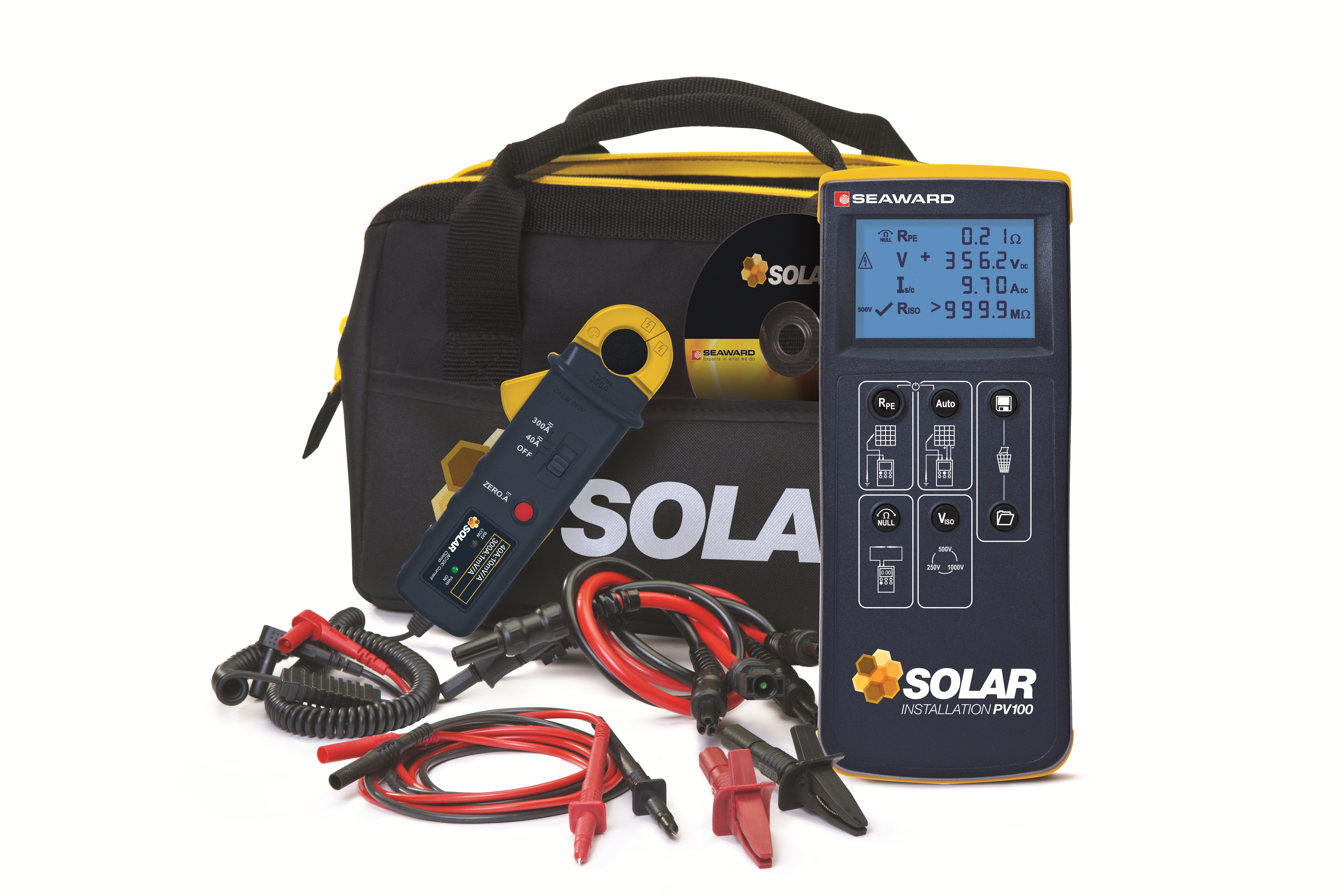Streamlined testing unit for solar systems

When testing PV arrays, you might find that you’re faced with juggling at least three different instruments for the job, for instance, a continuity/insulation resistance tester, a digital multimeter and a DC current clamp. Aside from the inconvenience of having to lug around multiple tools, these devices are not typically designed for direct connection to PV system interconnections, so you can find yourself resorting to makeshift test adaptors and short circuiting the PV strings for short circuit current measurement. This can pose the risk of accidental contact with live DC conductors or damage to the PV panels.
To combat this, Seaward Solar has introduced an all-in-one solution, the Seaward Solar Installation PV100, a multi-function electrical tester that is specifically designed for solar panel installations. The tool conducts electrical safety testing required under IEC 62446: Grid connected photovoltaic systems – minimum requirements for system documentation, commissioning tests and inspection as referred to in AS/NZS 5033:2005 Installation of photovoltaic (PV) arrays.
ADVERTISEMENT
This all-round tool carries out several tests including PV cable polarity, earth/ground continuity, insulation resistance, open circuit voltage (VOC), short circuit current (ISC) and operating current.
All the required measurements are performed automatically and the results are shown on an easy to read display which also indicates reverse polarity and shows if results don’t comply with requirements. Voltage and current results are also compared by the tester to check that they are within 5% of each other; another requirement of IEC 62446.
After completing the tests, the device can store the results in up to nine datasets which can be reviewed later or can be used to generate reports for clients.
Seaward Solar PV applications specialist Phil Old says the tool is great for electricians because it allows them to improve their efficiency when onsite.
“Seaward developed the PV100 based on industry demand for an all-inclusive PV installation testing kit which would improve safety and save time during testing. To make installers’ lives easier, we have included several features which are specifically designed for the use with PV installations, such as an auto-test sequence. It also features test lead resistance null (for when using test leads of up to 10Ω resistance) and visible indication when string Voc or Isc deviate more than 5% from the installation. Specially designed PV test leads are also included, which quickly connect and disconnect from the installation circuit,” he says.
“The kit also comes in a convenient carry case which contains everything needed to perform tests and even has room for accessories such as an irradiance meter and warning labels.”
Phil adds that unlike other testing products on the market, the PV100 is purposely designed to carry out tests that are specified by the relevant Standard.
“Some other products are designed to test PV installations and cover other forms of testing such as I-V curve tracing, however this isn’t a required form of testing for installation or periodic inspection,” he says.
“Also, some other devices don’t cover the full range of tests required by IEC 62446.”
As well as providing a convenient alternative to using several tools, the PV100 also presents a much safer option for electricians testing solar panels.
Solar PV arrays can generate hazardous levels of DC electricity as soon as they’re exposed to light, so to minimise the risk of direct contact with hazardous DC voltages, the PV100 uses PV connectors which plug directly into the leads from the PV array, cutting out areas of risk you would ordinarily experience with standard test probes.
“During testing, the PV string/module circuit is shorted within the tester to conduct the Isc measurement, which enhances the safety of the installer as they aren’t exposed to live wiring. It also negates the need for a short circuit box or for the circuit to be manually shorted – which cuts down on testing time and the equipment you need,” Phil says.
“It can also reduce costs – because the PV100 is a single unit, it only requires a single calibration service, which reduces the ongoing cost of PV system testing when compared to using multiple instruments.”
The tester comes with MC4 and Sunclix test leads making it compatible with a large proportion of PV installations. MC3, Tyco and Hubert and Suhner test leads are also available.
The Seaward Solar PV100 Text Kit is available in Australia through Emona Instruments.
-
ADVERTISEMENT
-
ADVERTISEMENT

